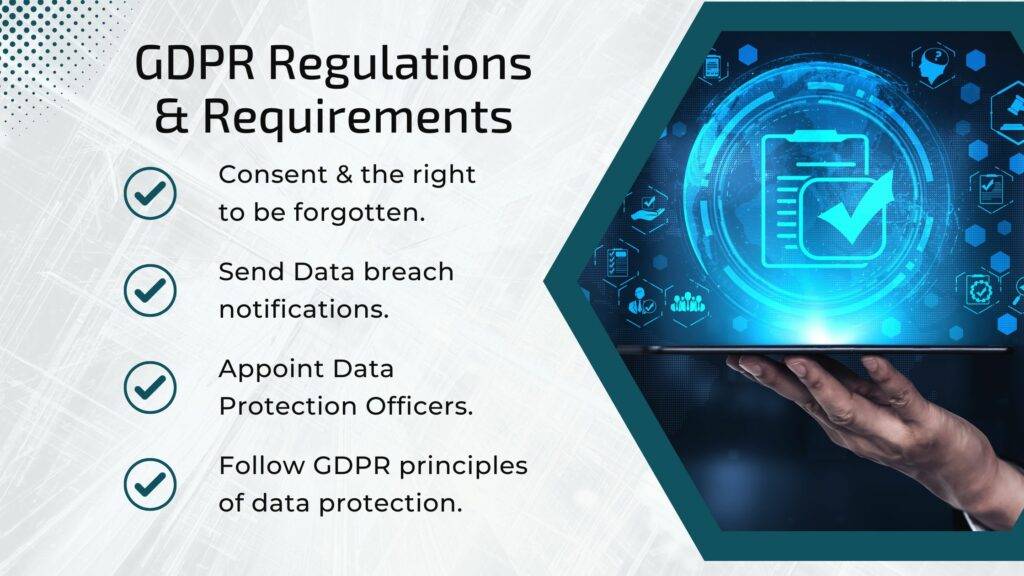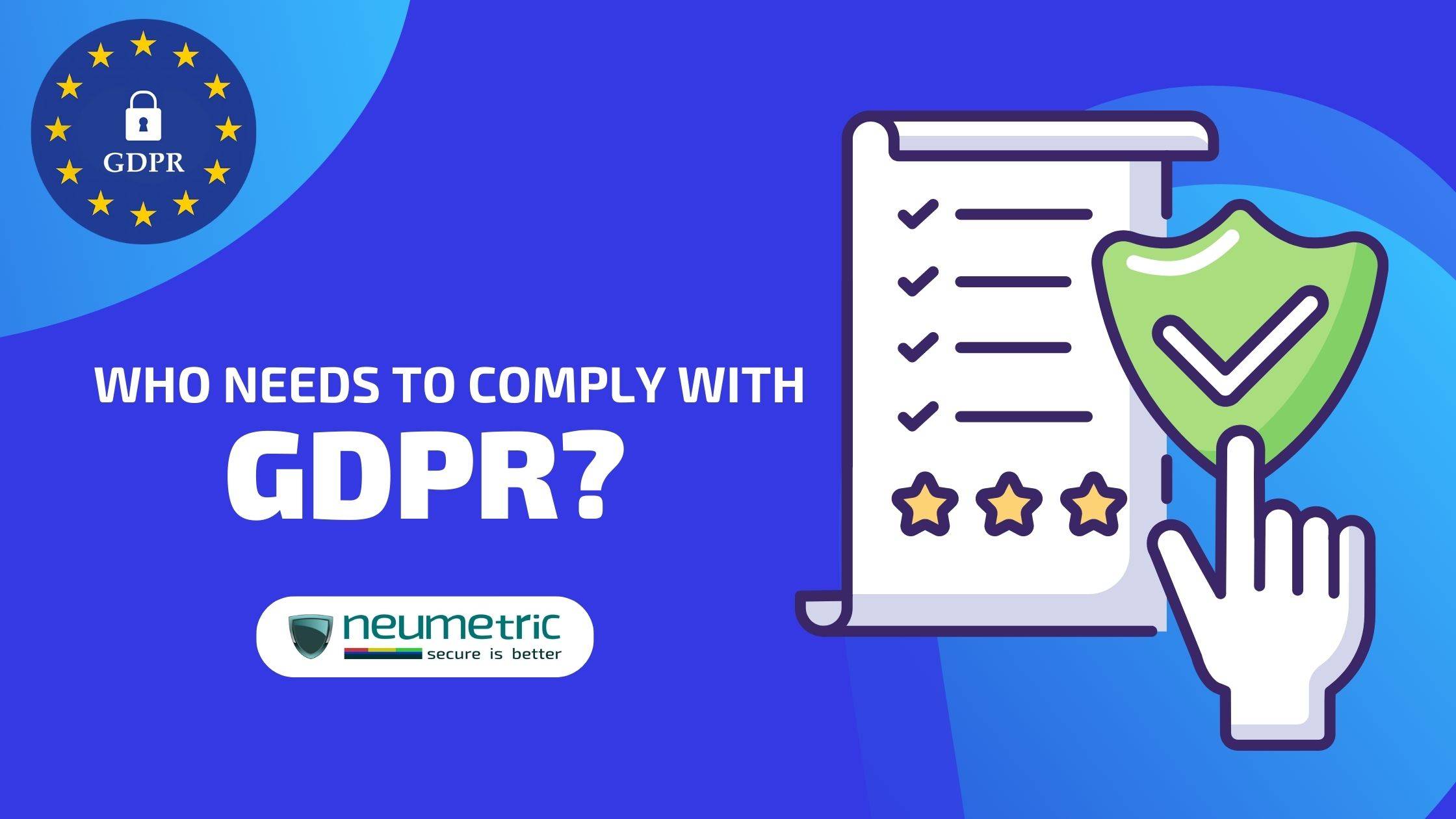Table of Contents
ToggleWho Needs to Comply with GDPR? A Guide for Businesses
Introduction
The General Data Protection Regulation [GDPR] is a Regulation implemented by the European Union [EU] in May 2018, which aims to protect the privacy & personal data of EU citizens. The GDPR was introduced in response to the increasing amount of personal data being collected & processed by Organisations. It provides a framework for protecting individuals’ personal data & ensuring that businesses handle it responsibly. GDPR Compliance is a legal requirement for businesses that process personal data of EU citizens, regardless of where the business is based.
The importance of GDPR Compliance cannot be overstated. Failure to comply can result in significant financial penalties & reputational damage for businesses. It is crucial that Organisations understand the Regulations & take appropriate measures to comply.
In this guide, we will provide a comprehensive overview of GDPR Compliance requirements for businesses. We will cover key topics such as the principles of data protection, lawful processing of personal data, individual rights & data breaches. We will also provide practical tips & advice for implementing GDPR Compliance measures in your Organisation.
Whether you are a small business owner or a large corporation, understanding GDPR Compliance is essential for protecting the personal data of your customers & employees. So, let’s dive in & explore what it takes to be GDPR Compliant in today’s digital landscape.
Who needs to comply with GDPR?
The General Data Protection Regulation [GDPR] is a Regulation implemented by the European Union, which has a broad territorial scope. The GDPR applies to all Organisations that process personal data of EU citizens, regardless of where the Organisation is based or where the data is processed. This means that businesses based outside the EU are also subject to the GDPR if they process personal data of EU citizens.
So, who needs to comply with GDPR? Any Organisation that processes personal data of EU citizens is subject to GDPR, regardless of the size of the business or the sector in which it operates. This includes businesses, non-profits & public authorities.
Determining whether your business needs to comply with GDPR can be a complex process. As a general rule, if your business offers goods or services to individuals in the EU or monitors the behaviour of individuals in the EU, then you are subject to the GDPR. This includes activities such as processing customer data, storing employee records & conducting marketing campaigns that target EU citizens.
Non-compliance with GDPR can have serious consequences for businesses. The GDPR imposes significant financial penalties for non-compliance, which can amount to up to €20 million or 4% of a company’s global annual revenue, whichever is higher. In addition to financial penalties, non-compliance can also result in reputational damage & loss of customer trust.
GDPR Regulations & Requirements

The General Data Protection Regulation [GDPR] has several Regulations & requirements that businesses must comply with when processing personal data. Let’s take a closer look at some of these requirements:
Consent & the right to be forgotten: The GDPR requires that Organisations obtain explicit & informed consent from individuals before processing their personal data. This means that individuals must be informed of the purpose of the data processing & must have the option to withdraw their consent at any time. Additionally, the GDPR grants individuals the right to be forgotten, which means they can request that their personal data be erased under certain circumstances.
Data breach notification: The GDPR requires that Organisations report any data breaches to the relevant supervisory authority within 72 hours of becoming aware of the breach. The GDPR also requires that affected individuals be notified without undue delay if the data breach is likely to result in a high risk to their rights & freedoms.
Data Protection Officers: Some Organisations are required to appoint a Data Protection Officer [DPO] under the GDPR. A DPO is responsible for overseeing data protection activities & ensuring Compliance with the GDPR.
GDPR principles of data protection: The GDPR outlines six principles of data protection, which are:
- Lawfulness, fairness & transparency: Personal data must be processed lawfully, fairly & in a transparent manner.
- Purpose limitation: Personal data must be collected for specified, explicit & legitimate purposes & not processed in a way that is incompatible with those purposes.
- Data minimisation: Personal data must be adequate, relevant & limited to what is necessary in relation to the purposes for which it is processed.
- Accuracy: Personal data must be accurate & kept up to date.
- Storage limitation: Personal data must be kept in a form that allows identification of individuals for no longer than is necessary for the purposes for which the personal data is processed.
- Integrity & confidentiality: Personal data must be processed in a manner that ensures appropriate security, including protection against unauthorised or unlawful processing & against accidental loss, destruction, or damage.
It is crucial for businesses to understand & comply with these Regulations to avoid financial penalties & reputational damage.
Steps to Achieving GDPR Compliance
Achieving GDPR Compliance requires a comprehensive approach that involves assessing data processing activities, identifying & addressing compliance gaps, developing policies & procedures & ongoing monitoring & auditing. Let’s take a closer look at these steps:
Assessing the data processing activities of your business: The first step towards achieving GDPR Compliance is to assess the data processing activities of your business. This involves identifying what personal data your business collects, processes & stores & how it is used. You should also identify the legal basis for processing personal data & ensure that all processing activities are documented.
Identifying & addressing compliance gaps: Once you have assessed your data processing activities, you need to identify any compliance gaps & take steps to address them. This may involve updating data protection policies & procedures, improving data security measures, or implementing new processes to ensure GDPR Compliance.
Developing & implementing GDPR policies & procedures: Developing & implementing GDPR policies & procedures is essential to achieving Compliance. This includes developing policies for obtaining explicit consent, responding to data breaches & handling requests from individuals to exercise their GDPR rights. It is also important to ensure that all employees are trained on GDPR policies & procedures & understand their responsibilities for GDPR Compliance.
Ongoing monitoring & auditing of GDPR Compliance: Achieving GDPR Compliance is an ongoing process that requires ongoing monitoring & auditing. This involves regularly reviewing data processing activities to ensure Compliance, conducting risk assessments & updating policies & procedures as necessary. Regular training & awareness programs should also be implemented to ensure that all employees are aware of GDPR requirements & their responsibilities for Compliance.
The Consequences of Non-Compliance
The General Data Protection Regulation [GDPR] imposes significant penalties on businesses that fail to comply with its Regulations. In this section, we will explore the penalties for non-compliance & the potential legal & financial consequences that businesses may face.
Overview of GDPR penalties for non-compliance: The GDPR has a tiered system of fines for non-compliance, with the maximum penalty being €20 Million or 4% of global annual turnover, whichever is greater. The penalties depend on the severity of the violation & can be imposed for a range of offences, including failure to obtain explicit consent for data processing, failure to report a data breach & failure to appoint a Data Protection Officer [DPO].
Understanding the potential legal & financial consequences of non-compliance: The legal & financial consequences of non-compliance can be severe. In addition to financial penalties, businesses may face legal action from affected individuals or regulators. This can result in costly legal fees & damage to the business’s reputation.
Non-Compliance with GDPR can also result in a loss of business, as customers may choose to take their business elsewhere if they do not feel that their personal data is being adequately protected. This can lead to a loss of revenue & decreased profitability.
Additionally, businesses may face operational disruption if they are required to change their data processing practices or policies to comply with GDPR Regulations. This can result in significant time & resources being spent on Compliance efforts, taking away from other important business activities.
It is essential for businesses to take GDPR Compliance seriously & take steps to ensure that they are meeting all the necessary requirements. By doing so, businesses can avoid the potential consequences of non-compliance & ensure the protection of personal data.
FAQs:
Who is required to comply with GDPR?
The General Data Protection Regulation [GDPR] applies to all Organisations that process personal data of individuals located in the European Union [EU], regardless of where the Organisation is located. This means that any Organisation, whether based within or outside of the EU, that collects, stores, or processes personal data of EU residents is required to comply with GDPR.
In addition, GDPR applies to both data controllers & data processors. Data controllers are Organisations that determine the purposes & means of personal data processing, while data processors process personal data on behalf of the data controller. Both controllers & processors have legal obligations to comply with GDPR.
How do businesses comply with GDPR?
Businesses comply with GDPR by:
- Assessing the data processing activities of their business.
- Identifying & addressing Compliance gaps.
- Developing & implementing GDPR policies & procedures.
- Ongoing monitoring & auditing of GDPR Compliance.
Do all companies need a GDPR policy?
Yes, all companies that process personal data of individuals located in the European Union [EU] are required to have a GDPR policy in place. The policy should outline the company’s procedures & processes for collecting, storing & processing personal data, as well as how the company ensures Compliance with GDPR Regulations. It should also include the rights of data subjects & the procedures for handling data breaches. The GDPR policy should be regularly reviewed & updated as necessary to ensure ongoing Compliance.
Who is not covered by GDPR?
There are certain entities that are not covered by GDPR, including:
- Individuals processing personal data for purely personal or household purposes, such as maintaining a personal address book.
- Law enforcement agencies & national security Organisations that process personal data for the purpose of preventing, investigating, detecting, or prosecuting criminal offences or for protecting national security.
- Organisations that process personal data exclusively for non-commercial purposes, such as religious or political Organisations.
- Public authorities that process personal data in the course of performing their official duties, such as courts & tribunals.
It is important to note that even if an entity is not covered by GDPR, they may still have obligations to protect personal data under other laws or regulations.


